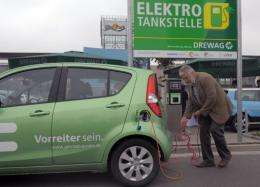Berlin to pay bln euro subsidy for electric cars

The German government is prepared to pay a billion euros ($ 1.4 billion) in subsidies over the next two years to help its industry develop electric cars, Welt am Sonntag newspaper said Sunday.
Chancellor Angela Merkel, in her weekly podcast Saturday, called for Germany to become the market leader in the new technology with a view to "having a million electric cars on our roads by 2020".
The cabinet is to discuss financial support for the industry as early as Wednesday on the strength of a report, due out Monday, in which the National Electro-mobility Platform", a government-sponsored commission of industry experts, recommends such a move, according to Welt am Sonntag.
The government is considering granting tax relief to the owners of electric cars, along with non-monetary measures such as special fast lanes and priority parking for such cars, the paper said.
"Contrary to what was earlier envisaged, there will be a very quick decision on government help", an unammed source close to the government told the paper.
The economic Wirtschaftswoche magazine reported earlier this month that the National Electro-mobility Platform commission would ask for "several billion euros' worth" of government support to spearhead the development of the new technology, seen as crucial to help reduce greenhouse gas emissions along with dependency on foreign oil imports.
On Saturday, Merkel said Germany, "where the first motor car was built", should become "the market leader and leading provider" for electric cars.
The two main problems in developing the new technology involve the building of long-powered batteries and the setting up of the infrastructure needed to recharge them, she said.
"For this there already exists a range of pilot projects and these must be quickly developed," she added.
"By 2030 there could be six million electric cars" on German roads, she added.
Germany's Automobile Federation (VDA) has announced that this year's Frankfurt international car show, to be held from September 15 to 25, would highlight electric cars.
The world's leading luxury car maker, BMW, has also announced its intention to launch its first all-electric urban vehicle in 2013, two years earlier than planned.
Daimler is poised to unveil this year an electric version of its mini "smart" car, as well as a version of its Mercedes A class, while Volkswagen, Europe's biggest automaker, expects to launch its electric car in 2013.
The automotive industry has long been one of the main engines of the German economy, spearheading its all-important export market and healthy trade surplus.
(c) 2011 AFP





















